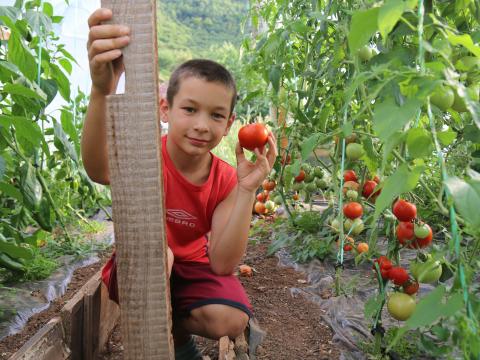Hard work is paying off for families in Bosnia and Herzegovina

It is a late summer day at the foot of Igman mountain, near Sarajevo, the capital of Bosnia and Herzegovina (BiH).
Vlado, 9, walks into the field, checks his crops, and smiles as he harvests a ripe tomato. During the spring season, he helped his parents prepare the soil and plant vegetables, and today he observes the results of their joint work with an expression of joy. His family used every available surface around the house to grow vegetables, and World Vision Bosnia and Herzegovina made these daily chores easier with the donation of an agricultural machine.
Vlado can't wait to show how the machine works and what it does in the garden. Under the supervision of his father, he starts it up and tills part of the land.
"Earlier, it took us a few days to prepare the land for sowing," says Vlado's father, Radivoje, "and now it takes us only a few hours."
Saving time is very important for this family. After taking care of their garden, Vlado's father and his older brother work for a daily wage, even helping other families in the area with their extra work. They’re not selective in the kind of work they do: they dig, chop wood, carry charcoal, and do just about any other job that is offered to them. "All kinds of work needs to be done in the village, and we do what anyone needs," says Radivoje.
Vlado’s parents aren’t employed, and the wages from these odd jobs are the only income the family receives. Growing their food, the family compensates for the lack of money in their household budget. On an average day, while the men are at work in the neighborhood, Vlado’s mother, Vedrana, takes care of the crops. All this labour is finally paying-off in late summer, and the vegetables are abundant in their garden. One portion of the harvest in the greenhouse is used immediately, while another is prepared for the winter. Potatoes are dug out of the ground at the end of the summer, stored in bags, and placed in a dark and cold place. Beans are picked, their shells are removed, and they’re stored–waiting to be cooked during the long winter. “We produce basic groceries on our own, but sometimes we even manage to sell something,” says Vedrana.
World Vision BiH supported 702 families in the past two years with tools, agricultural machinery, cattle, and other equipment needed to boost the income of the most vulnerable. "When you find a picture perfect greenhouse, full of produce, and see smiling faces full of hope, it is clear that you are doing the right thing," says Svjetlana Tanic Batinic, World Vision Program Manager for the Sarajevo region.
As part of the economic empowerment porgrammeWorld Vision staff visited and consulted with each family, determining the right way to meet their individual needs.
For instance, while Vlado’s family farms for a living, the five-member family that lives at the foot of Ozren mountain in northern BiH earns their bread by grazing sheep. "We take them out to graze, but we also feed them twice a day, with hay and supplements," says the middle child, 8-year-old Alen.
Each of his family members contributes to household chores in some way. During the school holidays, the children take the sheep out to graze, collect eggs from the laying hens, and help their parents with the crops.

The family has no income from the sheep yet, but they have a plan to expand the flock and are already calculating how to spend every penny of their father’s Dzevad modest salary. In addition to meeting basic needs, part of his salary was spent on building sheep pens and buying hay to feed the animals during the winter. "The labour market has been shaken by the pandemic, and I can lose my job any day. I'm trying to do something so I can always provide for the family,” Dzevad says.
At the end of autumn 2020, World Vision BiH donated five sheep to this family of five, and today there are already eight. Once the herd expands, the family hopes to receive livestock incentives from the local municipality and continue growing their herd.
Both mothers, Vedrana and Suada, lack any formal education, and both blame extreme poverty for this problem. Their parents could not afford clothes, shoes, transportation, and school supplies. They’re painfully aware of the opportunities that education can open for their children, and part of the income is always allocated for the things that their children need to go to school.